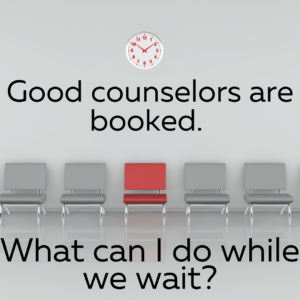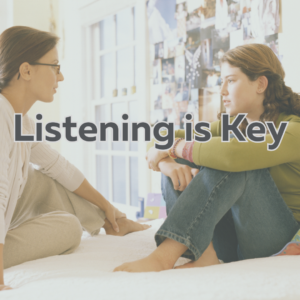0:00:03 – Speaker 2
Hey, this is Mandy and Kim with nextTalk, where we are passionate about keeping kids safe in the digital world.
0:00:09 – Speaker 1
Did you know? we have tens of thousands of listeners in 60 countries. It’s truly amazing, crazy.
0:00:15 – Speaker 2
Only God.
0:00:16 – Speaker 1
And, as a non-profit, everything we do at nextTalk is supported by people just like you.
0:00:21 – Speaker 2
Be a part of changing the culture of conversation in your home and around the globe by making a donation today.
0:00:28 – Speaker 1
Go to NextTalkorg and click on Give and check out our resources while you’re there More than cyber parenting conversations to connect.
0:00:36 – Speaker 2
We recently posted on social media and asked what podcast topics would you like us to cover? So a mom responded and I loved her response. This is what she said and I’m quoting here Being the recipient of their emotional vomit How to respond when they are cranky, argumentative, challenging and looking for a fight.
0:00:59 – Speaker 1
Let’s go. We can relate to that one for sure, For sure. You know we should probably define what we mean by emotional vomit, because maybe not everybody uses that term, But I love the way the mom described it. you know the cranky argumentative, all of that. But Urban Dictionary defines emotional vomit as when someone lets negative life experiences pile up, resulting in a massive explosion of emotion directed at another person. And I said it like that because that’s how it feels. You know what I mean.
0:01:32 – Speaker 2
It’s like ugh, i love both of those definitions, the way the mom describes it and the way Urban Dictionary says it. And, by the way, use Urban Dictionary to your benefit. Obviously, don’t do it in front of your kids, because some things that pop up are really bad, but if you’re trying to figure out what something means or lingo that they’re using Urban Dictionary like, look it up. I also loved what it said. It said that females often refer to this as emotional vomit, while males who do this are often referred to as beep tornadoes. Okay, now I’m not going to say that word, sh word because I know some kids listen and I don’t want to beep but poop tornadoes, oh my goodness gracious.
0:02:13 – Speaker 1
Well, whatever you call it, whatever you call it, i think we can all relate that you have experienced it right. I mean, i have, i’ve done it before, not only to my sweet, sweet husband, but maybe Mandy majors too, once or twice, or a hundred times.
0:02:28 – Speaker 2
You know what, Kim? I was just getting ready to say like we’re all guilty of this And I think about my two people that get my emotional vomit, and it is totally my husband and you.
0:02:41 – Speaker 1
Filled in the butt.
0:02:42 – Speaker 2
Sometimes it’s my text, sometimes it’s my screaming on the phone.
0:02:48 – Speaker 1
You know what, though It’s kind of an honor if you think about it, because you don’t do that with everybody, and that’s one of our points we’re going to bring up, like that’s a thing, like who you vomit on, it’s a thing.
0:02:58 – Speaker 2
It is because I feel safe with my husband and with you, right, i feel safe and protected and I also feel like you guys will speak wisdom into me. You’ll tell me hard truths.
0:03:08 – Speaker 1
Yeah, it’s really important. I’m thinking about this from the space of, yes, we’ve all experienced it or done it, but we want to kind of hone in on when our kids are vomiting on us, like what are some things to think about, consider and realize.
0:03:22 – Speaker 2
So I think the first thing we need to think about is do we have an emotional vomit or, as a kid, right And some, be careful with labels. We don’t really like labels, so be careful with that. But one thing you need to think about is some kids will do this like for a season. Maybe they’re having a stressful season and you’ll just see more of it come out of them And you know, sometimes that’s hormones when stress is really high, that sort of thing. Some will just be continually struggle with it. This is how they process. They let it build and build, and build and build and build and then like whoa, you know, sometimes that building is daily.
0:03:54 – Speaker 1
You know what I mean. It can be daily, It can be once a month, whatever. every kid’s different. So recognize when, where and if your kids an emotional Some kids may not struggle with this very often.
0:04:06 – Speaker 2
You know you may have a kid that likes to work out or process, analyze on their own. They’re finding other ways to kind of get the stress out, so they don’t need to emotionally vomit on you as much. So when they do, it’s very alarming to you because you’re like whoa, what is this? What is this? You know because it’s it’s a rare occurrence And so and this may change over time just because you have a kid right now that is often doing this with you, just unloading on you, they may like get to a situation where they figure out how to handle it and they don’t. They’re not doing it as much, and so we just need to always be in tune with our kids. They change over time, just like we do, yeah, yeah.
0:04:41 – Speaker 1
When they’re emotional and they’re vomiting on us, sometimes it’s like they’re cleaning out their systems. They’re cleaning out all those emotions that have built up and it come out as anger, attitude, frustration, sadness, and when all that’s happening, we can feel really attacked. So we have to be very careful about how we respond, because when you’re attacked, a lot of times we can go into a certain mode of response and we need to be aware of it.
0:05:05 – Speaker 2
Yeah. So here’s a couple of talking points that this was a team effort coming up with, some, and these are things that have helped in our home. You know, just remind us of when, when we have a kid emotionally vomiting on us or maybe even a spouse, like this is kind of how we can respond. The first thing is this don’t become 14 again. Don’t become this. We we have a team member that regularly reminds us of this, And it’s so true because oftentimes we want to snap back at them with something Well, you did this the other day, didn’t it, You know? and we become like a 12 year old or a 14 year old, just fighting.
0:05:42 – Speaker 1
We were a two year old sometimes. Sometimes a two year old throw in a tantrum.
0:05:46 – Speaker 2
Absolutely. And so we got to remember we are the adults, we have to be the ones to kind of not stoop to that level And we have to like meet them in the moment and like listen to what they’re saying, not take it personally, and then not snap back.
0:06:01 – Speaker 1
That’s so good. You know, one of the things that has helped me a lot personally is realizing that I can be a bucket, but I don’t need to be a sponge. That’s good.
Most of the time Yeah, you know, it’s what you just said. Most of the time it’s not personal, It’s not about me. It’s so hard in the moment because it feels like it’s personal and it sometimes it’s hurtful and it’s easy to become defensive and like we’re the target And that can make us feel rejected. It can make us feel like we have to say something. And if we know that ahead of time like I’m going to hold this bucket for my kid and I’m going to let them process in this moment, then we can choose to listen instead of absorb what they’re sending our way.
0:06:38 – Speaker 2
Well, and by not absorbing it’s almost like we’re creating a boundary of. I’m not going to allow myself to spiral, become 12 again or take this personally. I’m just going to let this be about them and I’m going to stay there. Exactly, be a bucket, not a sponge. I love that. So we kind of mentioned this at the beginning of the show.
But if you have a kid who is emotionally vomiting on you and it feels like such a burden, i want you to kind of flip your thinking here. They’re talking to you like you are their safe place. They’re probably not able to do this with their friends, with teachers, with their pastor. So you’re getting it all. Yes, it’s a lot to bear, it is, but I want you to be so thankful that they feel safe enough to come to you and talk to you about these things. You know, if they’re not finding a healthy way to cope with this stuff, you know we often see kids, you know, get addicted to drugs and start cutting and get super depressed, and so I want you to just flip your thinking. When they come to you and they’re emotionally vomiting, i want you to think to yourself I’m glad they’re getting this out in a healthy way and I can be their safe place.
0:07:46 – Speaker 1
I’m so glad you mentioned that because in that same regard, i have heard from many parents and I’ve experienced this too They’re like Your kid is great. They never act out, they’re so well behaved, they’re so polite, and that’s the same thing. They’re probably doing their best to function in this world all day long and they come home and they have to have a place to put all that And you are their safe place And I think that that can really be a gift for your kid And if we can flip our thinking and think of it as an honor that we get to hold that for them, it really helps in that moment to be in a good frame of mind. Does that make sense? Absolutely.
0:08:21 – Speaker 2
And going back to the bucket analogy, we said you can be a bucket but not a sponge. But I also want you to think about it like this too You’re not there to fix it, you’re just there to hold the bucket. You’re not going to be able to take away all the stress, the problems, not always But you are there to support, encourage, hold the bucket And, if needed, reach out to get more help. Maybe it’s a step more Like we need counseling. I’m not equipped to help you with some of the stress you’re dealing with, so let’s bring in a counselor, let’s talk to your pediatrician. That’s how we encourage and support our kids by holding that bucket.
0:08:56 – Speaker 1
And remember. Most of us are creatures of habit, and this is another thing that has helped me a lot personally is recognizing patterns. When this happens to my kid, they usually unload like this And I prepare myself, my head, my heart, and I’ve come up with different ways. When we come into that moment with the bucket and I see it coming, i already know these are things that help me and these are things that help my kid. So I’m not taking off guard, because I think sometimes when we’re surprised, we react poorly, and so preparing yourself when you recognize these patterns can really help you cope when it comes.
0:09:29 – Speaker 2
Another thing that I want to mention don’t engage when emotions are high. So this is a counselor. She told us this many years ago and it’s such good advice. She said when emotions are at a 10, just listen, Don’t try to resolve anything or problem solve or talk through the life lessons at that moment. Everybody needs to come back down to a three or four, And of course she’s referring to a scale of one to 10, where 10 emotions are way high. You can’t really have a logical conversation then. So everybody needs to be at a two, three or four, somewhere along those lines, to be able to talk through the life lessons. So when they’re at that high level 10, just let them get it out. They just need to empty those emotions.
0:10:12 – Speaker 1
Kind of piggybacking on. That is, when the emotions are back down at a level two or three. Especially with younger kids, i think it’s really important to help them recognize their behavior, not when they’re crazy town and at the 10, but walking them through that when they’re younger. Going back to hey earlier when you were upset. These are some of the things that you shared with me. You know, what did you think brought that on? Did it make you feel better? What are some other ways you can get those feelings out If mom and dad are not around, are there things that you’re doing or feeling? helping them process those things after the fact, when the emotions are back down to a low level, will prepare them more when they’re older, when they’re tweens and teens, to not constantly be emotionally vomiting, because you’re setting them up with some better coping skills.
0:10:57 – Speaker 2
You know, sometimes our kid is constantly having attitude, anger, frustration. But maybe they’re not emptying everything into the bucket, you know, we’re just seeing it come out in other ways. I do want to kind of cover this because I do think it’s relevant. You know one thing that I’ve found extremely helpful instead of just getting onto them about the anger or the attitude or whatever is presenting itself, instead of just being like you don’t treat me like that, you don’t treat others like that, instead of just doing something like that, i will kind of flip it and be like hey, i’ve noticed you’re struggling a bit, like how can I help you? And you know, maybe that will get them to open up And those are for the parents that they’re just not emotionally vomiting, you know, but you’re seeing that something is off. I think that’s really important. You always got to be taking your kid’s temperature and seeing what’s happening, because if they’re not opening up to you, they’re processing somehow all the things that are coming at them at the world. So how are they? We want to identify that.
0:11:53 – Speaker 1
And also know your boundaries. You know if your kids profane, they’re violent or making threats, recognize when it’s time to get professional help for your sake and for their safety. It’s hard to think about that, but when those things are happening they’re crossing that line where you know this is beyond just them having a rough time and having a struggle processing. You’ve got to know when to step away and to get some professional help for both of you.
0:12:18 – Speaker 2
Yeah, i mean, you know, emotional vomiting is not an excuse for abuse, And so you got to be careful here. We definitely have boundaries. We can’t let them cross. That’s our job as parents, you know. The other thing is it’s okay to take a break. Yeah, if you have had one of those days you’re at your breaking point. Your kid walks in. Stop it before it happens. stop the treatment, you know you know the feeling.
you’re like I cannot do this anymore. You feel like you’re going to respond badly. You can say I have to take a minute because I’m not in the right headspace to be helpful right now. One of the things that we’ve done in our home is, like we say we need to. we just need a reset moment. We need a reset moment. So, whatever that looks like for everybody it may be everybody going off into the four corners of their house and just being by themselves for a minute. It may mean taking a bubble bath, it may whatever. Listen, i want to hear this, but I just I need a minute, because what we don’t want to do is then emotionally vomit and then we become 12 again because we’re not in the right headspace.
0:13:14 – Speaker 1
Yes, Yes, i’m glad you said that, because we can know all the things right. We can know the way to respond, we can plan, we can prepare, but we’re also human and you can feel that feeling when it is not the right time. So recognize your own emotions too. I think that’s so important. You know what else?
0:13:29 – Speaker 2
would you add?
0:13:29 – Speaker 1
here. We love your input. We want to hear from you. So if you’re dealing with an emotional lometer what’s worked for you You can email us at admin at nexttalkorg and share your story.
Transcribed by https://podium.page



